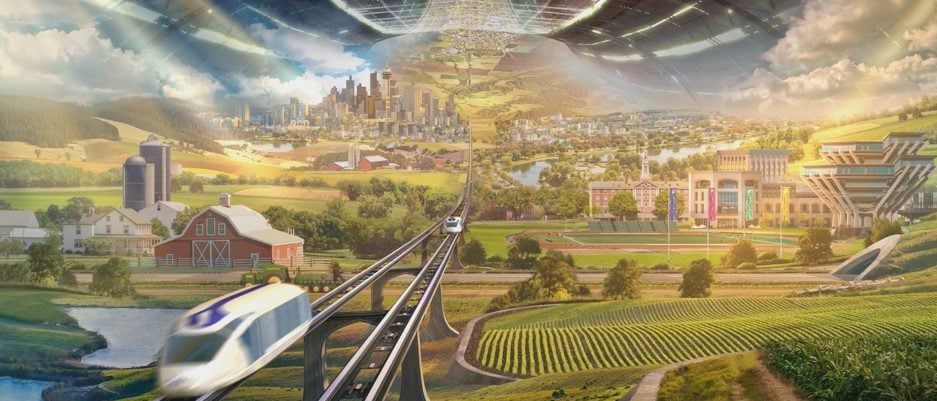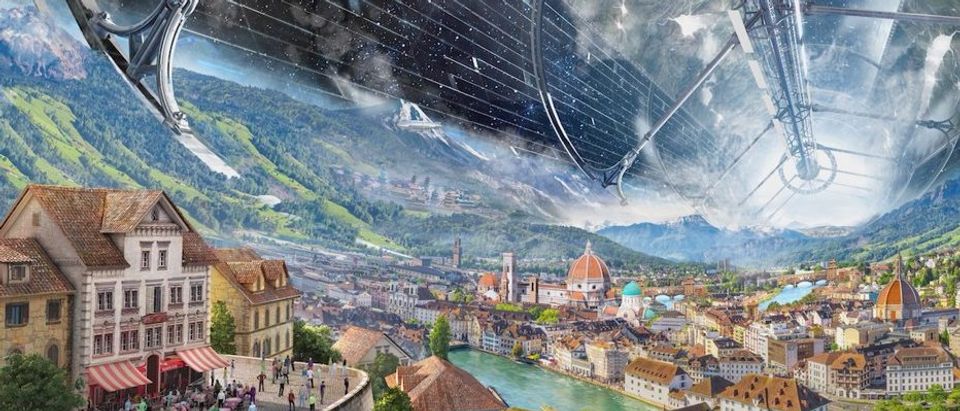SpaceX CEO Elon Musk and Amazon and Blue Origin CEO Jeff Bezos have two different visions for a space future. Musk wants to colonize Mars. Bezos wants to construct free-flying space settlements.
Which vision is the more realistic?
Musk has wanted to go to Mars since he first started SpaceX. He would like to build a self-sustaining city on the red planet, effectively expanding humanity into a multi-planet species.
Bezos has a far more ambitious idea. He would like to build giant, free-flying space colonies capable of sustaining a million people each, constructed from materials mined from the moon and asteroids. The colonies would be in the shape of cylinders, hollowed out on the inside and rotating to create artificial gravity. Towns and green spaces would be located on the insides of these structures, with temperatures controlled for human comfort. The idea for these colonies was originally proposed by one of Bezos’ instructors, Princeton Professor Gerard K. O’Neill.
Musk is already building the hardware that he thinks he needs to start sending people to Mars. He is developing the “Starship” spacecraft both at the Kennedy Space Center and at the SpaceX private space port at Boca Chica in south Texas. Coupled with the “Super Heavy” first stage rocket and a refueling capacity, Musk believes that he can start sending cargo and eventually people to Mars sometime in the middle 2020s.
Moreover, SpaceX is developing the “Starlink” satellite system that, when completed, will bring internet services to every part of the globe. One estimate suggests that Starlink will generate as much as $50 billion each year. Even considering the cost of maintaining and enhancing the system, Musk will have plenty of money left over for a private Mars colonization program.
Bezos, on the other hand, has a steeper hill to climb. Blue Origin has yet to launch anything into low orbit, much less to the moon or asteroids. Moreover, the infrastructure needed to build the free-flying space colonies he envisions would be staggering in its scope and incalculable in its cost. Bezos would have to set up both mining and fabrication facilities in space.
Jeff Bezos is the world’s richest man. He also plans his own internet satellite constellation that could generate some revenue. Blue Origin and SpaceX are partners of NASA’s Artemis program to return to the moon.
Still, SpaceX would be likely to build its Mars city long before Blue Origin even starts its first free-flying space colony. Musk has already mocked Bezos’ plans. “Makes no sense. In order to grow the colony, you’d have to transport vast amounts of mass from planets/moons/asteroids. Would be like trying to build the US in the middle of the Atlantic Ocean.”
At least Mars has a lot of material at hand that can be fabricated into habitats. Water can be mined, and oxygen can be generated. Musk advantage would be having just one destination to send the cargo and people required to build an interplanetary Jamestown or Plymouth.

Artist’s rendering of a floating space habitat proposed by Jeff Bezos. Photo Credit Blue Origin.
Bezos, if he were inclined to respond at all, would argue that his free-flying colonies would have Earth-normal gravity. No one has conducted research into how living and reproducing in a low gravity environment such as Mars affects the human species.
Also, while it is not clear what the economic basis of a Mars colony would be, Bezos envisions space factories using lunar and asteroid material to manufacture products impossible to make on Earth, using microgravity, “hard vacuum” pressure, and extreme temperatures.
Some visionaries have imagined turning Mars into a replica of Earth, as the planet was billions of years ago, through terraforming. The process would require building an electromagnetic shield in space to block solar wind from stripping away Mars’ atmosphere. Air, water, and an ecosystem could be restored. In a few hundred years, future Martians could walk across Mars’ landscape without having to wear spacesuits, under a Martian sky.
The world is fortunate to have two ego-driven men who want to summon their own version of the future on the high frontier of space and who have the means to do so. Who would win? Perhaps both, given time and effort.
Mark Whittington (@MarkWhittington) is the author of Why is It So Hard to Go Back to the Moon? and The Moon, Mars and Beyond. He also operates his own blog, Curmudgeons Corner.
The views and opinions expressed in this commentary are those of the author and do not reflect the official position of The Daily Caller.


